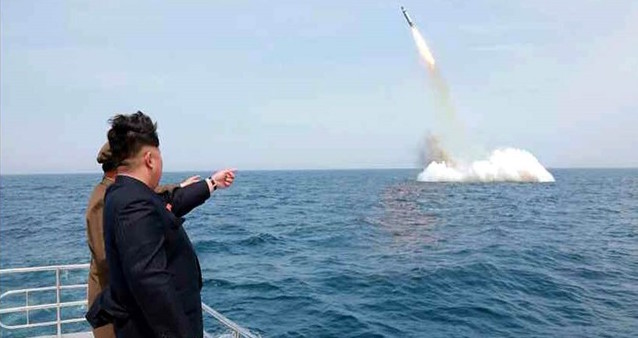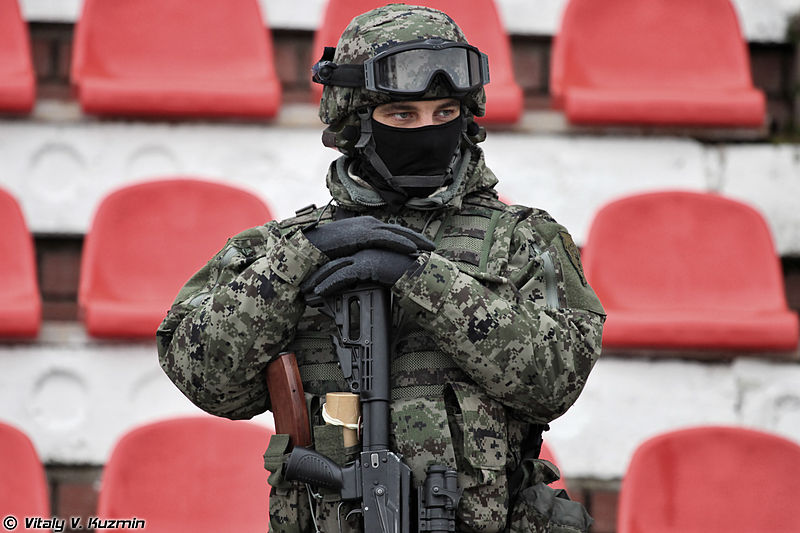Khalid Mahdi: Containment
Research Analyst
Given the success seen through the P5+1 negotiations with Iran, many have begun to wonder whether a similar formula could be applied towards a feckless North Korea (DPRK). Pyongyang has not only conducted multiple nuclear tests in the face of robust sanctions and growing international condemnation, but American officials have recently provided alarming analyses of the DPRK’s ability to mount these weapons on Intercontinental Ballistic Missiles.(ICBMs) While I question the validity of these assessments, failure to contain or possibly dismantle such a program may leave the U.S. and its allies with no choice but to recognize the unpredictable DPRK as a nuclear state.
China’s recent decision to launch a host of more robust sanctions against its age-old ally is no doubt a positive development, but it is not anything new or surprising. The development of the North’s nuclear program has certainly been a thorn in China’s side, yet the DPRK’s violations of international norms and nuclear obligations demonstrates that the Chinese fall short of controlling North Korea. Furthermore, I question how far China is willing to go to economically strain the DPRK, given Chinese investments within the North and continuing concerns over internal stability.
Finally, dating back to the unsuccessful Six-Party talks, which formally came to an end in 2009, the U.S. has set a terrible precedent of leniency towards this state. Previous administrations offered the DPRK a significant degree of inducements, while President Obama’s foreign policy has repeatedly failed to maintain “red lines” against the North.
Given my cynicism towards the ability of sanctions to inflict meaningful change, the most rational choice appears to be containing the further development of the DPRK’s weapons programs. Unlike Iran, the North’s nuclear program appears to be heavily reliant on the extraction of uranium from sites across the country, so great emphasis should be placed on hindering its ability to acquire the materials necessary to develop ballistic missiles and nuclear technology. This could be possibly achieved by expanding the scope and reach of current programs, such as the Proliferation Security Initiative, which focus on the interdiction and search of vessels suspected of carrying WMD and associated materials.
David Sutton: Four Might Be The Magical Number For Now
Research Analyst
A fifth nuclear test seems unlikely at this point; Kim Jong-un has already achieved his objective of demonstrating the capability of his nuclear arsenal. With the world paying attention, and the propaganda machine of the DPRK able to churn out the story for the foreseeable future, even the unpredictable regime in Pyongyang can see that a fifth test would be pushing it too far.
Two major reasons may determine this prudence: China and, more importantly, the North’s economy. China, North Korea’s economic and diplomatic lifeline, has had its interests harmed by Pyongyang’s provocative behaviour. Chinese people near the border with the North fear a nuclear mishap and therefore push their own government to rein in Pyongyang, while every nuclear test further justifies the U.S. military presence in South Korea.
Besides the risk of antagonizing his patron, Kim also has the pressing issue of the economy. He has taken to ensuring loyalty among his regime’s elites through lavish gifts. Dubbed the “Royal Court Economy,” the costs of maintaining this system have until recently been increasing, causing speculation that the state coffers are strained.
With some economic initiatives already in place, a fledgling gray economy, and pressure from China to move away from nuclear weapons, now would seem like an opportune time for a change of focus. As possible as it is for Pyongyang to revisit the nuclear situation, the issue of creating new streams of revenue is an issue of survival, which is the Kim dynasty’s only real goal.
With all this established, how should the international community respond if a fifth test occurs? Reinforce security arrangements with Seoul and Tokyo, and push forward plans to install a THAAD missile defence system in South Korea. Tensions will rise between Beijing and the West, but more so between Beijing and Pyongyang.
Marko Gombac: Regional Cooperation Is The Key, Not Unilateral Demands
Program Editor, International Business and Economics
Should North Korea conduct another nuclear test, unilateral action and demands should be avoided as a reflex reaction. International sanctions have been historically infective in dealing with Pyongyang’s nuclear program. Issuing hostile declarations and demands will not produce much of a result; this may even serve as validation for North Korea’s leadership. Nor is it reasonable to suggest any type of military action against Kim Jong-un’s regime, as it is still legally tied to China through a mutual defence treaty.
Rather, North Korea’s only ally should be seen as part of the solution for the West. China has no interest in seeing further nuclear tests. President Xi Jinping has expressed his disapproval of the most recent test, and further testing stands to strain the North Korea – China relationship even further. Involving China in resolving this problem will allow for a compromise that is acceptable to the strongest regional player. Any other move will only serve to aggravate the delicate situation and create another flashpoint in a region already brimming with them. It could very well be the flashpoint that sparks a much larger conflict, one that no one is fully prepared to face.
Layla Wahbi: Keep China On Board
Program Editor, NATO’s Arc of Crisis
Following its fourth nuclear test, North Korea is on a persistent path to developing its weapons arsenal. In order to prevent this, the entire international community must come together to develop a response.
Widening the scope of sanctions will be required. Political and economic pressure on North Korea, in conjunction with China, to denuclearize will be beneficial to convince leaders that a nuclear status will be a dead-end option. Expanded sanctions enforced on trade and business may be useful, as well as heightened pressure on Pyongyang from its economic life-line in Beijing.
It is essential to maintain China’s support for these sanctions, as they are a key player in enforcing action from the international community. China is likely to support these sanctions given the strain between the state and North Korea in recent months, and the country’s nuclear development is a thorn in China’s side.
Marissa Young: A Call For Strengthened Alliances
Program Editor, Women in Security
When considering the case of North Korea’s nuclear testing, it seems that most diplomatic options have been exhausted, and that there is very little that can be done to secure the international community. However, most are mistaken in thinking that deterring Pyongyang requires hard power and coercion.
After years of trying to tackle the North Korean nuclear debate, it is clear that there needs to be a shift in tactics. Specifically, the international community must focus on alliance building and soft power as an avenue towards change. Particularly, the United States, South Korea, and Japan need to make alliance building a stronger focus in their policy to deter North Korea from more nuclear testing. Although it will yield neither the same short-term gains that come with intervention nor catchy media headlines, it is strategic to play the long-term game. If the North’s nuclear program is successful, all three states would suffer potentially devastating repercussions.
Likewise, it is evident that it will take more than one state’s power to deter North Korea from proceeding with nuclear testing. These risks provide even more ground to focus on a long-term plan that emphasizes stronger alliance building. The United States, South Korea, and Japan are all major powers in the region, all with a vested interest in stopping North Korean nuclear testing. Having these three powers working together to create strong, multilateral policy could be the key to mitigating the North Korean threat.
Andi Asimetaj: Vigorous Enforcement Of Sanctions
Program Editor, Canada’s NATO
North Korea’s nuclear program has created security challenges for the international community. Therefore, regional actors should respond by taking a multilateral approach in sanctioning North Korea through trade, investment, and finance for its nuclear testing.
The United States should lead the international community in enforcing sanctions. North Korea’s belligerent and provocative behavior poses a serious threat to the world; as such, a comprehensive strategy that engages all the instruments of national power is pivotal in applying effective sanctions. The model used against Iran severely targeted financial institutions and should also be implemented against North Korea. Defying international agreements has repercussions, and the international community has a responsibility to impose penalties on violators.
A key political actor in implementing and maintaining successful sanctions is China. China plays a crucial role in the international community and it could easily apply sanctions. It could do so by cutting off energy imports to the DPRK. Suspending energy shipments would bring North Korea to the bargaining table.
The pressure has to come collectively from the international community in cutting ties with North Korea. Cutting finance and maintaining transparency in military shipments, as well as sanctioning foreign entities supplying missiles and nuclear technologies, would be advisable. In order to maintain peace and stability, North Korea must be sanctioned through trade, investment, and finance until it is ready to comply with the rules of the international community.
Natasha Dobrijevic: It’s Time For China To Step Up
Program Editor, Expanding Community
As of January 2016, North Korea has conducted four underground nuclear tests, each one taking it closer to its goal of controlling a nuclear weapon. The detonation of the latest weapons test was picked up as a magnitutde-5 earthquake originating from an underground complex near China, where three previous tests had already taken place. The launching of an Unha-3 satellite only a month later heightened the international community’s concerns and led to expanded sanctions against North Korea. These sanctions are somewhat a cause for celebration, as China is on board.
Nonetheless, China needs to step up its game and rethink the relationship it has with its neighbour. Beijing has consistently softened any sanctions levied against Pyongyang, rather than putting its full strength behind them. If China were to threaten to topple North Korea’s fragile economy by ordering its own banks and companies to stop doing business there altogether, we would see a more cooperative attitude from the would-be nuclear power. The international community is fighting for its security, but without China’s full support, the fight may be lost.




